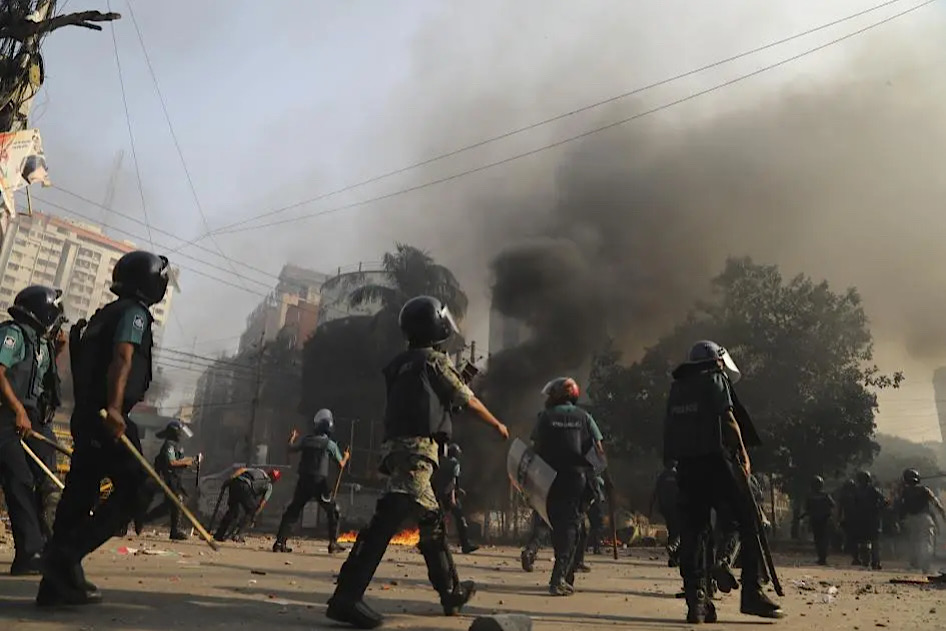Bangladesh at a crossroads, amid economic, political, military, minority challenges
Speaking to AsiaNews, Card Patrick D'Rozario appeals “for peace, calm and no revenge”. For the first time, student leaders join a caretaker government. There is uncertainty over the role the military will play in the period leading up to the election, expected over the next three months. Activists and analysts stress the importance of maintaining stability.
Dhaka (AsiaNews) – Bangladesh is a country at a crossroads. After weeks of student protest, it faces major economic challenges, political uncertainty, and social instability.
Amid attacks against Christians and Hindus in violation of the spirit of the protest movement, the country is looking to a possible return to power of the opposition after years dominated by Sheik Hasina and her Awami League. Hanging over everything, the long shadow cast by the military.
The flight of the former prime minister has led to a transitional government under 84-year-old Nobel laureate Muhammad Yunus, which includes – for the first time in the world – two young men who led the 36 days of unrest.
With the success of the protest movement, opposition parties now see an opportunity to take power, even if they are inexperienced, at a critical time with potential tensions ahead of the upcoming election.
Card Patrick D'Rozario, archbishop emeritus of Dhaka, spoke about the developments that are turning the country upside down. “We prayed to the Lord for many days and I feel what has happened is God's Will, good or bad. He knows everything,” said the prelate.
The cardinal made an "appeal for peace, calm and no revenge," hoping that the caretaker government and the student leaders will respect "the rights of minorities”. In fact, the new administration is already urging such respect following a first wave of violence.
“I appeal to people to respect human beings, respect citizens of the country, respect people of other religions, etc. This too is mentioned by the new administration and I support it.”
Invoking the principle of harmony, the cardinal offered his prayers that “discrimination may not be perpetuated in any form. We pray for those who sacrificed their lives, those who were killed and we pray for the caretaker government. God Bless our country.”
In addition to the opportunity for the opposition to return to power, there is another factor that will be decisive for the country's immediate future: the role of the military in a government that, at least for now, is still led by civilians.
In the past, the military has seized power when civilian governments fell, leading the country for long periods, forming new political parties like the Bangladesh National Party (BNP) and the Bangladesh Jatiya Party. Their possible intervention could add another element to the crisis.
Meanwhile, caretaker Prime Minister Yunus has already announced that the policemen involved in the violence that caused the death of student protesters will be tried, fuelling further doubts about the possibility of holding a “free and fair” election as many experts warn.
“The rate at which policemen are being killed and police stations are being burned – it’s only a matter of time before things spiral out of control,” human rights activist Khushi Kabir told AsiaNews, stressing the importance of restoring stability.
Since Hasina’s fall, the police chief and a senior army officer have been dismissed, while many detained protesters and many political protesters have been released.
Protest leaders have also called for the resignation of several judges from different courts, including the High Court.
Finally, there is the issue of minorities, including Christians, who represent about 8 per cent of the population, victims of growing persecution because they have been traditionally seen as Awami League supporters.
Meanwhile, one of the student leaders who led the protest that ousted of Sheikh Hasina and is now part of the caretaker government is calling for the former prime minister to be tried for the killings that took place in recent weeks, at least 300 people according to the latest count.
“I am curious why she fled the country,” said student leader Nahid Islam in his first interview. “We will seek justice for all the killings that happened under her, that has been one of the main demands of our revolution. Even if she does not come back, we will work towards that,” he said, speaking about the former prime minister who ruled for 17 of the past 30 years.
Hasina's son, Sajeeb Wazed Joy, from the United States where he has lived for some time, said that Hasina will return to Bangladesh from India once elections are announced in the next three months. The latter was one of the main demands of opposition movements.
He explained that his mother, whom he advises, did not resign before leaving the country and taking refuge in India last Monday. “My mother never officially resigned. She didn’t get the time,” he told Reuters.
“She had planned to make a statement and submit her resignation. But then the protesters started marching on the prime minister’s residence. And there was no time. My mother wasn’t even packed. As far as the Constitution goes, she is still the prime minister of Bangladesh.”
Sajeeb Wazed Joy plans to run for the Awami League in the next election.
(Nirmala Carvalho contributed to this article)
18/06/2010







.png)










